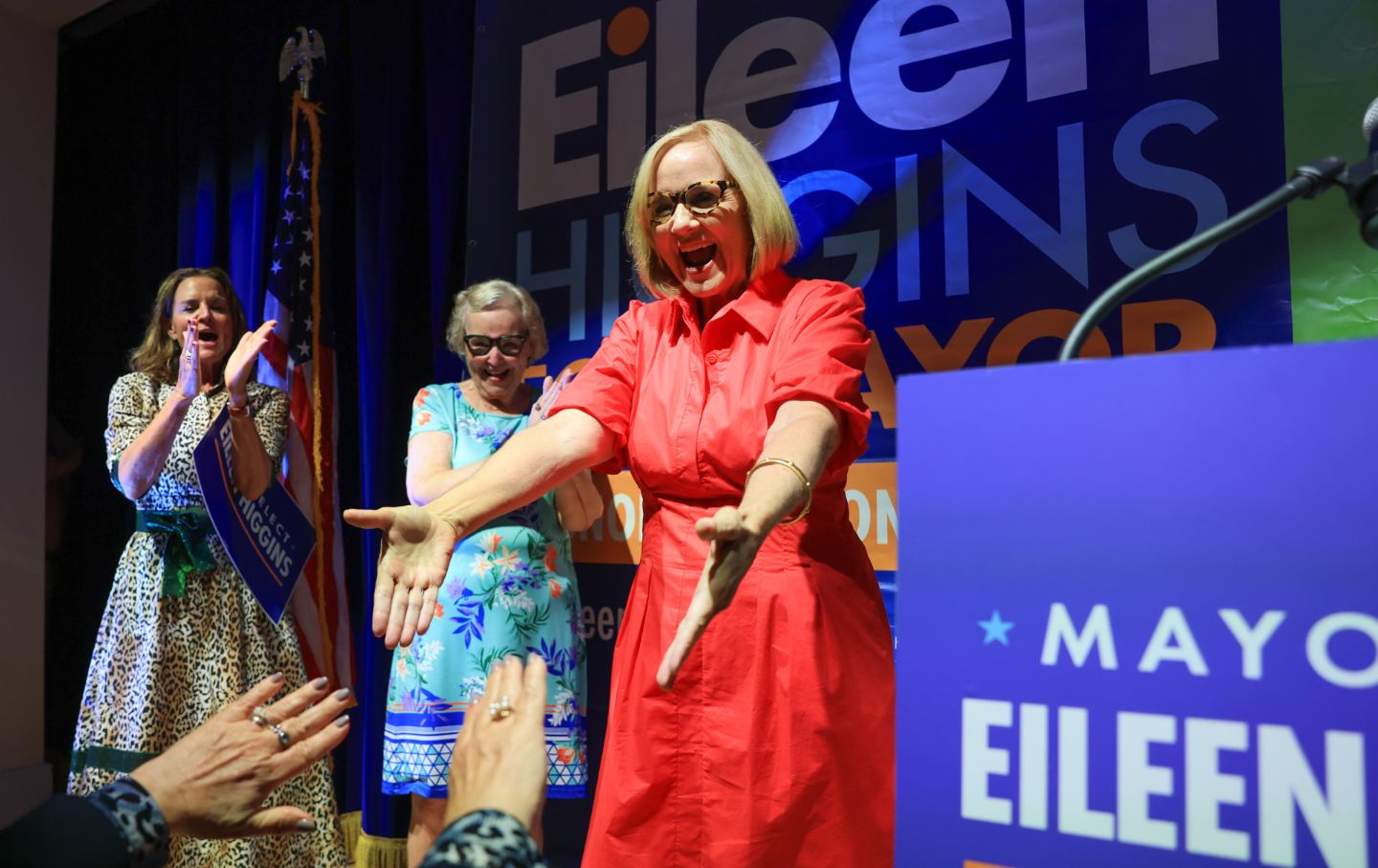America’s Two-Party System Failure
While Republicans seek power on behalf of their disgraced former leader, Democrats have all but gone into hiding.

An American flag above the Washington Monument is seen split nearly in two June 12, 2018.
(Sarah Silbiger / CQ Roll Call)Watching the effluvia-driven campaign cycle carom back and forth from the hoary (Biden is too old, special prosecutor claims!) to the bathetic (Trump debuts new line of sneakers and cologne!), it’s easy to lose sight of the larger forces that have produced the fiasco-in-the-making known as the 2024 presidential contest. A long-standing shibboleth among elite political observers is that, in the end, “the party decides”—meaning that amid the unruly tumult of democratic life, sober political professionals are the adults in the room, dictating the basic terms of engagement by allocating resources and selecting leaders on a clear calculus of rational self-interest. All of this closely calibrated realist programming and counter-programming thus delimits the art of the possible in this, our sage, reasonable, and eternally difference-trimming American republic.
Yet simple math shows that the leaders of our major parties have repeatedly and stupendously failed to meet their most basic professional obligation: to line up rosters of electoral talent that inspire activism, expand electoral maps, and build sustainable governing coalitions. The GOP’s Trumpist realignment of 2016 has produced a supervillain takeover of the party infrastructure, with an authoritarian ex-president dictating the party’s lead policy agendas and personnel choices. All the while, of course, that same glorified mob chieftain has presided over a long string of balloting failures, hamstringing the GOP at the polls in the last three electoral cycles, and giving the Democrats a steady barrage of special-election wins.
The Democratic leadership caste, meanwhile, stubbornly refuses to relinquish its autopilot setting. As legitimate questions about Biden’s age and mental acuity accumulate, party leaders offer two basic responses: They either demand that people stop talking about the whole subject or they blame the media for keeping speculation about Biden’s apparent decline alive. But such reflexive scolding and process-based complaints don’t account for the Democrats’ own dereliction in putting forth a robust and persuasive case for the positive benefits that would accrue from Biden’s reelection. Here’s how New Republic editor Jason Linkins sizes up the current state of play:
What do the Democrats stand for? Who are their enemies? What fights do they want to pick? Can they even answer these questions? Because while they dither, the public is forming some wild opinions about what should go in the spaces they’re leaving blank. Recent polls indicate that half of Americans think that Biden got favorable treatment from Hur in the document probe. Another recent poll indicates the public blames Biden for killing the border deal, despite the fact that Trump publicly browbeat GOP electeds into nuking it. After the expiration of the expanded child tax credit, voters who had received those benefits swung their support to the GOP, despite the fact that they were the most prominent opponents of the expansion. And majorities of voters still don’t hold Trump responsible for the repeal of Roe’s abortion protections.
Instead of meeting these first-order political challenges head-on, Linkins writes, Democrats “are getting in their own way, mired in weird pathologies and maladroit tendencies, timidly waiting for nonexistent referees to come and level the playing field on their behalf.” One small but telling recent sign of this core incompetence was the Biden team’s decision to turn down, for the second year running, the offer of a presidential Super Bowl interview. This was the absolute softest of softball media opportunities, one that could powerfully lay to rest voter angst over Biden’s age before a historically massive TV viewing audience (one that was additionally inflated by the presence of Biden-sympathizing megastar Taylor Swift in a Kansas City Chiefs skybox). But by deliberately sidestepping this colossal free-media gift, Democrats instead invited yet more speculation about Biden’s shaky performance; instead of supplying the 2024 electorate with the reassuring spectacle of an avuncular president talking football, celebrity love affairs, and other civic-religious American pieties, the Democratic braintrust left the vast citizenry of football nation once more thinking, What are they trying to hide?
This long-standing allergy to populist messaging has been the Democrats’ undoing for so long that it takes a considerable strain of the imagination to recall that the party enjoyed a lopsided House majority along with that rare achievement of modern politics, a filibuster-proof Senate majority, as recently as 2009. What happened then is what has happened to Democratic majorities ever since the 1994 Republican revolution: This position of strength was deployed for a donor-backed legislative initiative—the Affordable Care Act of 2010—and then promptly discarded in an election cycle where Democrats once again proved clueless in spelling out how they proposed to materially advance the public weal. Those messaging blanks were once more filled in by the right, which sent the prevailing discourse aflame with scare rhetoric of death panels, relocation camps, and, yes, the immigrant fleecing of noble American birthrights.
Now, with the US economy performing at historic highs on Biden’s watch, Democrats are falling over themselves on how to deliver a basic, unifying “morning in America” appeal—even though the Biden economy is, on virtually every metric, outperforming the one that Reagan mined for his historic 1984 landslide reelection win. But the core failing here is less a function of errant focus-group testing than a reflection of the Democrats’ own prevailing professional-class outlook.
Where Republicans tend to look on the seizure of power as a means to escalate their prevailing political messaging—hence Trump’s Ahab-like fixation on harnessing the “deep state” to wreak revenge on his fast-multiplying roster of political enemies—Democrats view the procurement of political power as the equivalent of gaining admission to Harvard or Yale: The hard work of showcasing one’s meritocratic value is now over, and one can set about checking boxes and winning accolades from one’s legacy-class cohort. Put another way: Republicans tend to view office-holding as the moment when political work starts, while Democrats tend to see elections as the point where the messy, faintly embarrassing business of politics comes to a blessed halt. That’s why, to take but one flagrant recent example, Barack Obama promptly mothballed his potent digital-grassroots mailing list once it had served its prime purpose of gaining him the presidency. Politics simply didn’t interest him that much, as he moved on to the prime governing directive—blindly pursuing doomed, self-undercutting “grand bargains” with a radicalized Republican Party hell-bent on making him a one-term president.
The combined effect of Democrats’ elite indolence and Republicans’ authoritarian deference has yielded a two-front political assault on popular sovereignty: a replay of the 2020 election cycle in which the overwhelming majority of voters desperately want other candidates put forth to lead the country. To break this deadlock, as my colleague John Nichols has argued, Biden strategists would be well-advised to demonstrate the incumbent’s vigor by building his relection campaign around a far-ranging argument pivoting on the urgent need to reclaim and expand a democratic polity from harms wrought by seven years of unrelenting siege from the MAGA right. That case has become far easier to make as Trump is poised to lose much of his fortune in adverse legal judgments and (as his former fixer Michael Cohen says) will become even more likely to sell out the country for cash gains. In his recent outbursts against NATO and his delayed and Putin-free response to the killing of Russian dissident Alexei Navalny, Trump has reached unanticipated new heights of Putin appeasement.
There’s an encouraging road map for such a strategy in Wisconsin, which has long served as a prime case study in gerrymandered right-wing capture of all facets of political life. On Monday, Wisconsin Governor Tony Evers signed a landmark bill into law that rescinded absurdly GOP-skewed state district maps, and restored the most fundamental principle of democratic self-rule: one person, one vote. As Democratic state chairman Ben Wikler explains, this dramatic win came about through a corresponding grassroots mobilization predicated on the simple idea of regaining control of the political process from the ground up. “The one lesson of the story of the fall and rise of Wisconsin is relentless, year-round, always-on organizing,” he says. “The way we did this was by winning key Supreme Court elections in 2018 and 2023, preventing Republican supermajorities in the last election, and by preventing Republican candidates from winning in more local, off-the-radar fights.”
In other words, the best way to win at politics is by… doing politics. “I think Democrats can fall into this misimpression that politics is this distasteful process that you use to get into office, which you can then put in the rearview mirror and focus on governing. But governing and politics are always connected, as they should be,” Wikler says. What’s more, he adds, the electorate is primed to make that same connection, once the case is put to it, directly and simply: “Voters genuinely do want a politics that makes things work better for everyone. You don’t have to be shy about fighting to expand access to the ballot, to make districts fair, and to make the courts responsive. All those things are popular. Indeed, the core contrast in American politics now is that the Democratic Party is focused on working for working people and focused on turning common sense toward the public good, while Republicans are focusing on extreme and authoritarian MAGA positions on everything from abortion rights to ballot access.”
The small-d democratic makeover of Wisconsin was all but unthinkable four or five years ago, as GOP majorities seemed virtually carved into the landscape. But motivated and organized activists can remake the landscape: “All the people who mobilized against Trump never stopped mobilizing,” Wikler says. “The core Democratic ideas around freedom and opportunity, and building a country that treats every person with dignity are enormously popular. And we don’t have to self-flagellate to act on them.”
During the 2008 primaries, Democratic elites still grasped the core importance of a motivated base: Pivoting away from a weak establishment-résumé candidate, they embraced a movement politician who brought energized new and younger voters into an increasingly affluent, change-averse, and sclerotic Democratic coalition. But once Obama was out of power, the national party reverted to form, frantically strategizing to defeat another base-expanding insurgency in the first post-Obama primary cycle in order to nominate the very same underperforming candidate in defiance of a host of profound tectonic shifts in the electorate toward a populist view of basic issues of political economy. In 2020, they again put down the Sanders movement by engineering a host of candidate withdrawals in advance of Super Tuesday in order to put Joe Biden on a power-glide path to the nomination—but Biden, always a creature of party politics, briskly remade his political brand from “the senator from MNBA” into a tribune of working America. Yes, the party decided then—but only up to a point, beyond which its standard-bearer realized he had to embrace a ground-up political vision in order to win. If that model can again prevail, the Democratic Party needs to decide with some urgency to get out of its own way.
Disobey authoritarians, support The Nation
Over the past year you’ve read Nation writers like Elie Mystal, Kaveh Akbar, John Nichols, Joan Walsh, Bryce Covert, Dave Zirin, Jeet Heer, Michael T. Klare, Katha Pollitt, Amy Littlefield, Gregg Gonsalves, and Sasha Abramsky take on the Trump family’s corruption, set the record straight about Robert F. Kennedy Jr.’s catastrophic Make America Healthy Again movement, survey the fallout and human cost of the DOGE wrecking ball, anticipate the Supreme Court’s dangerous antidemocratic rulings, and amplify successful tactics of resistance on the streets and in Congress.
We publish these stories because when members of our communities are being abducted, household debt is climbing, and AI data centers are causing water and electricity shortages, we have a duty as journalists to do all we can to inform the public.
In 2026, our aim is to do more than ever before—but we need your support to make that happen.
Through December 31, a generous donor will match all donations up to $75,000. That means that your contribution will be doubled, dollar for dollar. If we hit the full match, we’ll be starting 2026 with $150,000 to invest in the stories that impact real people’s lives—the kinds of stories that billionaire-owned, corporate-backed outlets aren’t covering.
With your support, our team will publish major stories that the president and his allies won’t want you to read. We’ll cover the emerging military-tech industrial complex and matters of war, peace, and surveillance, as well as the affordability crisis, hunger, housing, healthcare, the environment, attacks on reproductive rights, and much more. At the same time, we’ll imagine alternatives to Trumpian rule and uplift efforts to create a better world, here and now.
While your gift has twice the impact, I’m asking you to support The Nation with a donation today. You’ll empower the journalists, editors, and fact-checkers best equipped to hold this authoritarian administration to account.
I hope you won’t miss this moment—donate to The Nation today.
Onward,
Katrina vanden Heuvel
Editor and publisher, The Nation
More from The Nation


The Supreme Court Has a Serial Killer Problem The Supreme Court Has a Serial Killer Problem
In this week's Elie v. U.S., The Nation’s justice correspondent recaps a major death penalty case that came before the high court as well as the shenanigans of a man who’s angling...

Corporate Democrats Are Foolishly Surrendering the AI Fight Corporate Democrats Are Foolishly Surrendering the AI Fight
Voters want the party to get tough on the industry. But Democratic leaders are following the money instead.

Marching Against a Corrupt Regime Marching Against a Corrupt Regime
People taking to the streets for democracy.

It Would Be Madness to Give Trump and His Toadies Even More Power It Would Be Madness to Give Trump and His Toadies Even More Power
And yet, that’s what the Supreme Court appears prepared to do.

Trump Is Dragging Republicans to Crushing Defeat After Crushing Defeat Trump Is Dragging Republicans to Crushing Defeat After Crushing Defeat
The president is deeply unpopular, his policies are failing, and Republicans are losing—everywhere.


